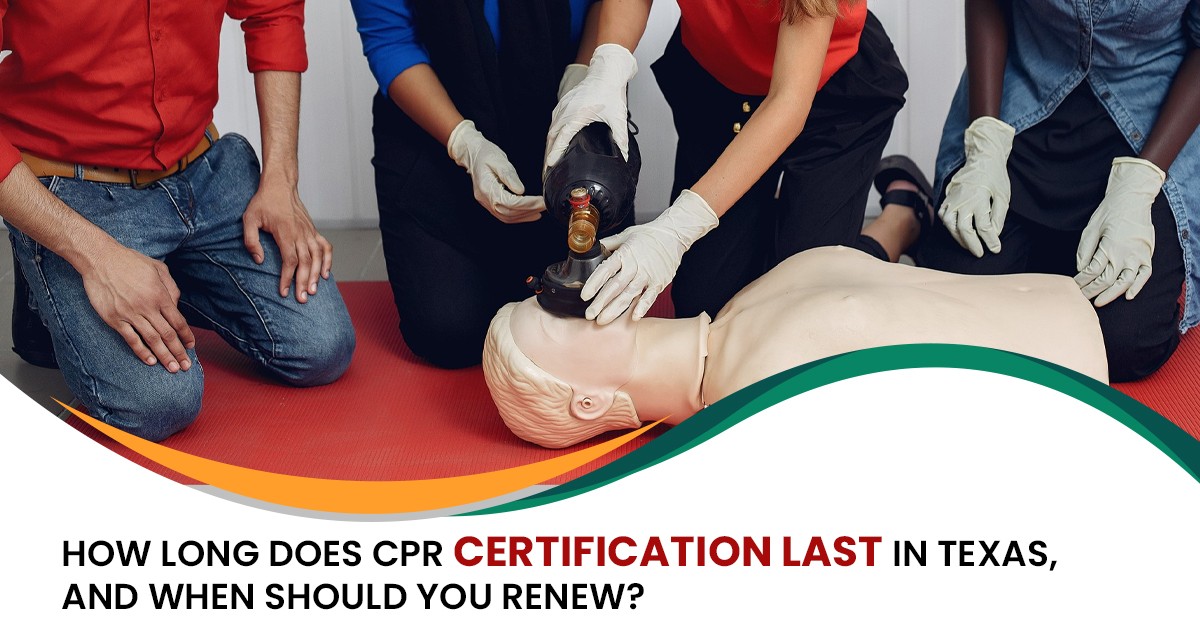Texas Onsite CPR Blog | Return to Blog Index
How Long Does CPR Certification Last in Texas, and When Should You Renew?
August 20, 2025

For professionals whose jobs demand quick, life-saving action, CPR certification is more than just a credential; it’s a responsibility. Whether you work in healthcare, education, safety services, or corporate environments, knowing exactly how long your certification remains valid is crucial. Many people who take CPR classes for healthcare providers in Texas don’t realize that their certification has a defined expiration date and that renewing on time is key to staying compliant and confident.
At Texas OnSite CPR, we believe that CPR renewal isn’t simply about meeting a deadline; it’s about keeping your skills sharp, ensuring your readiness, and meeting the exact standards required in Texas.
CPR Certification Duration in Texas
In most cases, CPR certification in Texas is valid for two years from the date of issue. This standard applies to both lay rescuers and healthcare professionals. However, the validity period may vary depending on the certifying body (such as the American Heart Association or American Red Cross) and the type of CPR course you take. Some employers also require earlier recertification, often every 12 to 18 months, to ensure ongoing compliance and skill retention.
Why Renewing on Time Matters?
The techniques and guidelines for CPR are not static. Every few years, organizations like the American Heart Association update their recommendations based on new research and medical best practices. Waiting until your certification expires means you risk being out of compliance and possibly unprepared when it matters most. By renewing on time, you avoid knowledge gaps, keep your credentials active, and maintain your readiness to act in emergencies.
Signs It’s Time to Renew Early
Even if your CPR card is still valid, there are situations where early renewal is smart:
- New Job Requirements: If you change employers or roles and your new position requires specific CPR credentials, early renewal may be necessary.
- Skill Fade: Studies show CPR skills can begin to fade as early as six months after training without practice.
- Updated Protocols: If significant changes in CPR techniques are introduced, renewing early ensures you’re following the most effective, up-to-date methods.
The Renewal Process in Texas
Renewal doesn’t have to be time-consuming. Many professionals opt for CPR classes in Texas that offer blended learning, combining online coursework with in-person skills testing. This approach reduces classroom time while ensuring hands-on proficiency. At Texas OnSite CPR, we bring training directly to your workplace, making renewal seamless and efficient for teams of any size.
Special Considerations for Healthcare Providers
Healthcare providers often have stricter renewal standards due to the nature of their work. If you’re in a hospital, clinic, or emergency services role, your employer may require you to maintain active BLS (Basic Life Support) certification at all times. This means enrolling in CPR classes for healthcare providers in Texas before your current certification lapses, sometimes even several months early.
Consequences of Letting Your Certification Expire
If your CPR certification expires, you may:
- Lose eligibility to work in certain roles until renewed
- Face compliance issues during audits or inspections
- Need to retake the full CPR course instead of a shorter renewal course
- Experience reduced confidence in your life-saving abilities
Stay Current, Stay Prepared
CPR certification is not just a box to check; it’s a skill that can make the difference between life and death. At Texas OnSite CPR, we make the renewal process simple, flexible, and tailored to Texas standards. Whether you need CPR classes in Texas for individual recertification or on-site group training, our programs are designed to keep your skills fresh and your certification current.
FAQs
- How long does CPR certification last in Texas?
Most CPR certifications are valid for two years, though some employers may require earlier renewal.
- Can I renew my CPR certification before it expires?
Yes. Early renewal is encouraged if your job role changes, your skills feel rusty, or new protocols are introduced.
- Do I have to take the full course if my certification expires?
If your certification lapses, you may need to complete the entire CPR course again rather than a shorter renewal class.
- Are there different renewal requirements for healthcare providers?
Yes. Healthcare providers often need to maintain continuous BLS certification, meaning timely renewal through CPR classes for healthcare providers in Texas is essential.
- Does Texas OnSite CPR offer on-site renewal training?
Absolutely. We provide on-site CPR classes across Texas for individuals, businesses, and healthcare teams, ensuring convenience without sacrificing quality.
Don’t wait for your card to expire. Contact Texas OnSite CPR today and schedule your renewal so you’re always ready to respond when it matters most.
Texas Onsite CPR Blog - Return to Blog Index





 FORT WORTH
FORT WORTH